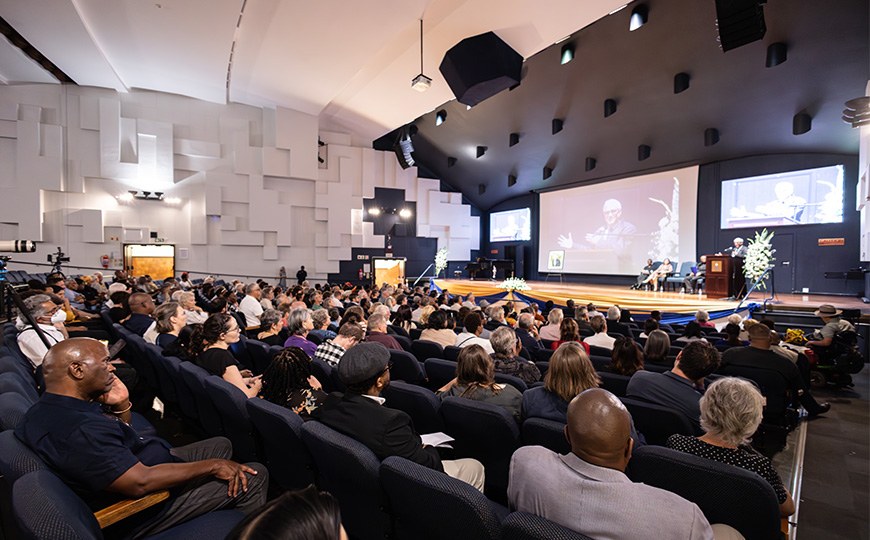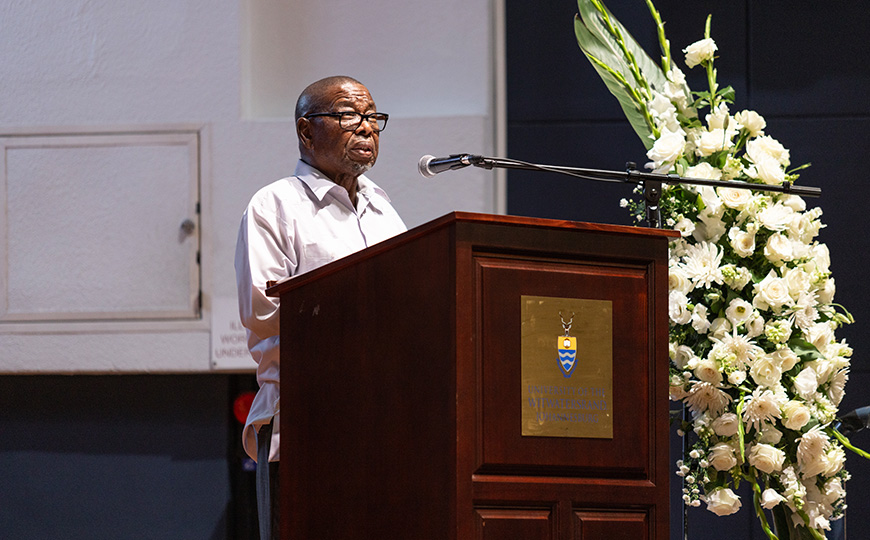Remembering Eddie Webster: A man of boundless curiosity
- Wits University
Professor Eddie Webster was remembered as a beacon of wisdom.
On Saturday, friends, family, colleagues and luminaries from all around South Africa and the world gathered in the Great Hall at Wits to pay tribute to Professor Edward (“Eddie”) Webster, who died on March 5 at the age of 82.

There is no one word to describe “comrade Eddie” as he was known in many circles. He was a top sociologist, an activist, a teacher, a scholar, a proponent of labour rights, an enemy of inequality and an enormous asset to Wits academic staff from 1976 to 2024, when he still supervised postgraduate students.
It always seems a pity that great humans cannot attend their own memorial services to bask in the praise heaped on them. If this were possible, Eddie would have blushed at the compliments paid to him on stage.
Dean of the Wits Humanities faculty, Professor Mucha Musemwa, spoke of Professor Webster’s profound impact, “not only in the hallowed walls of academia, but also in society. He was a guiding light, a beacon of wisdom and compassion. His commitment to scholarship was matched only by his unwavering dedication to social justice, equality and the empowerment of marginalised communities and the people who live within them.”
Musemwa read an address from President Cyril Ramaphosa, who sent condolences to the Webster family, Luli Callinicos, children Kimon, Alexia, Helen and Thalia and their seven grandchildren and said: “We have together lost a friend, father, activist, intellectual, guide and mentor”.
Having witnessed Webster’s role in the rise of the trade union movement from the 1970s onwards, the President said, “Eddie was always thinking of how to strengthen the bargaining power and protect the interests of the most vulnerable sectors of our society”.
Others unable to be present contributed taped segments. Wits Vice-Chancellor and Principal Professor Zeblon Vilakazi said that as a son and stalwart of Wits, Eddie embodied the qualities that the university strives to instill in its graduates. “Throughout his nearly five decades at Wits, he was always guided by a moral compass and evidence-based truth.”
Professor Michael Burawoy, Professor of Sociology at the University of California, Berkeley related the tale of his first meeting with Eddie in 1968, when they were both teachers at King David school, and Burawoy was lodging with Luli Callinicos, social historian and founder member of the Wits University History Workshop. “I liked to think that Eddie was visiting so much because he enjoyed my company, but of course it was Luli he was coming to see. I now like to think that I contributed to their relationship of over 40 years — Eddie the turbulent windmill; Luli the quiet voice of reason.” They met again when Burawoy returned to SA in 1990, although they always kept up with each other. “Eddie showed me what could be done with sociology,” said Burawoy. “He inspired me and many others to redefine the meaning of sociology as a political intervention without losing its integrity as an academic enterprise. His sociology of hope carried us through what often seemed to be hopeless times. He taught us that there was always a way forward.”
Professor Imraan Valodia, Pro Vice-Chancellor of Climate, Sustainability, and Inequality and director of the Southern Centre for Inequality Studies (SCIS) at Wits, and chair of the second National Minimum Wage (NMW) Commission, spoke of Eddie’s role in bridging the gap between what the university does on the inside and what goes on in the real world on the outside. “I think Eddie did not see the university as a place where ideas were generated and then taken to the world, but rather that ideas should themselves be informed by what was happening in the real world. His life illustrates his thinking about that relationship in a symbiotic way. His life’s work of promoting education for workers is a key part of that.”
Professor Michelle Williams, head of the Wits Sociology Department, speaking on behalf of her entire department, defined Eddie’s conception of the university thus: “It must be guided by ethical principles. This commitment to social justice must course through a knowledge production — teaching, supervision, writing and building democratic and relevant institutions. He held himself to the same principles. He believed deeply in transformative non-racism, for him, the point of the university was to make the world a better place, being engaged in the social issues of its time. Eddie’s engagement went beyond the university gates through South Africa, Africa and the world, and he constantly embraced new ideas and challenges. He built enduring institutions such as the Global Labour University (GLU), the Society, Work and Politics Institute (SWOP) and SICS. Perhaps most importantly, Eddie built bridges, and never allowed any disagreement to dehumanise him.”
Dr Prishani Naidoo, director of SWOP, one of Eddie’s legacies and the home of many intellectuals, said the institution has run for over 40 years according to Eddie’s principle of critical engagement: “a defiance of the autonomy of the researcher but also a critical self-reflexivity of being open to critique emerging from different contexts and different schools of political thought … a collective inheritance that is our debt to Eddie, for pasts and futures still to come”.
Dr Blade Nzimande, Minister of Higher Education, Science and Technology, first worked with Eddie on the board of the South African Labour Bulletin in the 1980s, and their association continued on many levels, with arguments and discussions at lively collegial events. “Eddie altered the times of some of his courses at Wits to late afternoon so that workers and trade unionists could attend. I was one of those, along with Gwede Mantashe. Eddie often reminded us that this was not a Cosatu gathering.” Apart from his contributions to the labour movement, Nzimande spoke of Eddie’s “enduring lifelong role as a scholar and sociologist. The labour movement does not need rituals to remember him. His work, his legacy and his writings are with us. Our task is to turn to them.”

Professor Sarah Mosoetsa, Eddie’s protegé, now CEO of the Human Sciences Research Council (HSRC), said: “I encountered Eddie at Wits in 1996 and I am standing here because of him. He taught me sociology and he taught me life, he taught me to always finish what I start, not for me but for generations to come … Eddie, while your peers were chasing ratings and ‘impact factor’, you were worrying about the value of a child, of a mineworker, and in your recent work the unionisation of scooter delivery drivers.”
Professor Karl von Holdt, former director of SWOP, Eddie’s longtime friend and debating partner, reminisced about his sometimes-combative friendship with Eddie, which began in 1986. “I had heard about this man, and I heard his classes were the gateway to the unions. I’d also heard that he was a Menshevik. I sort of thought I was a Bolshevik. A friend introduced us and the meeting did not go well. It was a bad start to what became a 40-year friendship and collaboration. I discovered the Menshevik but I also discovered a man who had this boundless curiosity to understand the world and how it is changing … Lately, Eddie refused to accept that the digital economy negates the labour movement; and he proved he was right. For Eddie, ideas were living things, all grist for his mill. He wanted everyone to be intoxicated with the interrogation of what is going on now and how it might change the future. He always said the best teacher is one whose students go on to supersede them. His term ‘critical engagement’ became the basis of a recent book I worked on. It was coined by a young Eddie Webster who saw ideas as sparks coming out of the moment, to be examined in every different way.”
Jaclyn Cock, professor emeritus in the Department of Sociology at Wits University, Honorary Research Professor in the Society, Work and Development Research Unit (SWOP) and lifelong friend of Eddie, encapsulated his life in this sentence: “The miracle is that the apartheid machine never realised how dangerous he was”.

